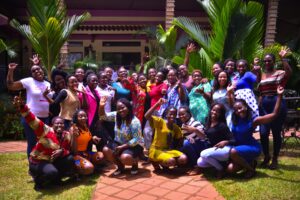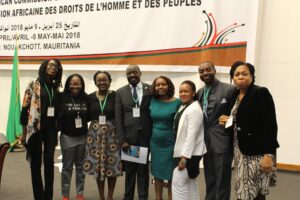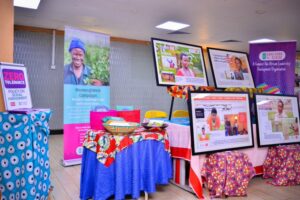
WHO WE ARE
Akina Mama wa Afrika (AMwA) is a pan-African feminist leadership development organization founded in 1985 by a group of African women living in the diaspora, who remained keenly aware of their African roots and the need to organize autonomously. We were named Akina Mama wa Afrika which means solidarity among African women. Collective action is therefore our birthright. We were fearless right from birth and remain so, having chosen to identify as feminists at a time when the word was largely shunned in Africa and beyond. Our boldness stems from our unwavering desire for women’s agency and gender justice.
For the last 35 years, we have relentlessly focused on uprooting all forms of deeply entrenched patriarchal structures and systems that use power and privilege to oppress, exclude and exploit women. We have been doing this by increasing the visibility of women’s lived experiences, particularly those living on the margins of society. We have been building women’s individual and collective power to influence policy and social change.
Our flagship programme – the African Women’s Leadership Institute (AWLI), (and a pioneer on the continent), is well known for igniting feminist fires and has produced a strong community of over 8000 feminist leaders aka AMwAzons who are championing a progressive women rights agenda in different parts of Africa. Equipped with the knowledge and tools to dismantle patriarchy, our alumni have been instrumental in forming social movements campaigning against gender inequality, women’s exploitation, and discrimination.
Through collaboration with sister organizations, we have established strong coalitions which have brought critical women’s rights issues to policy-making spaces at the national and regional levels. We are proud members of the Solidarity for African Women’s Rights (SoAWR), NGO CSW Africa, the Gender Is My Agenda Campaign and more recently Tax Justice Network AfricaOur collective energies have carried us far by expanding our influence. While the journey to gender justice remains long and arduous, we value the platforms through which we are amplifying African women’s voices, holding governments accountable, and influencing policy reforms. Notwithstanding the setbacks, we celebrate our contribution to the ratification and domestication of the Maputo Protocol; African Union Agenda 2063; and the zero-tolerance campaign on Sexual and Gender-Based Violence in the International Conference of the Great Lakes Region Pact on Peace, Stability, and Development, among others. Our consultative status with the United Nations Economic and Social Council has also enabled us to promote inclusion in global frameworks by connecting local issues to the global and our newly acquired Observer Status at the African Commission on Human and People’s Rights which gives us the legitimacy to not only present human rights concerns before the Commission and hold States accountable but also to influence the thematic areas for the Commission’s attention.
We acknowledge the continuous pushback on women’s rights and are actively creating our own spaces for collective interrogation, reflection, and strategizing. As the current host of the Uganda Feminist Forum (UFF) and working group members of the African Feminist Forum (AFF), we have devoted our energies to feminist movement building and organizing in Africa. These spaces have been instrumental in building feminist consciousness and engagement with both pervasive and emerging women’s rights issues, especially those challenging prejudice, taboos, and stigma. While ideological differences continue to undermine efforts to forge a shared political purpose as feminists, we are mindful of not reproducing patriarchal oppression. At AMwA, how we conduct our work is as important as the work itself and we are intentional about sisterhood, inter-generational solidarity, and intersectional feminism in pursuit of a gender-just society.
Vision
AMwA envisions a dignified and equitable feminist society for African women and girls in all their diversities.
Mission
To build feminist leadership and collective power to deconstruct intersectional systems of oppression to advance women and girls social justice
Guiding Principles
Feminism: Our work is rooted in and guided by the Charter of Feminist Principles for African Feminists. We believe that the everyday lived experiences of African women and other minoritized persons can only transform if we interrogate and seek to shift structural power.
Pan Africanism: Our work puts the interests of Africans and African women first, bearing in mind the legacies of slavery, colonialism, imperialism, and economic exploitation of the continent. True liberation for all Africans can only be achieved by addressing this legacy and working towards a common vision of the Africa we want.
Diversity and Inclusion: We value diversity and inclusion and see it as the first step in centering the voices and experiences of those who are structurally excluded. However, we do not see it as an end in itself but as a vehicle for equity and justice.
Integrity: We are committed to walking the talk and holding ourselves accountable to the people we work with and for. We will always strive for excellence and rigor in the work that we do; and proper stewardship of the organization’s resources.
Solidarity: We believe in strengthening our collective power and taking collective action to effectively resist. The power that we challenge can only shift with a chorus of voices across movements, gender, race, class, national boundaries, etc.
Intersectionality: We recognize how systems of power interact to further oppress groups and individuals that are marginalized. We are cognizant therefore that change can only happen by dismantling these power structures while centering the needs and experiences of minoritized groups.
Learning: We are intentional about learning and challenging ourselves to think outside the box, to take risks, and to consider new ideas and new ways of doing things in response to the challenges of the day.



